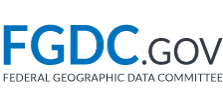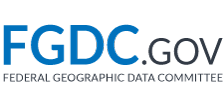Action items.
Hosts: Michelle Torreano and Rebecca Moser, EPA Attendees: Ivan DeLoatch, FGDC Acting Staff Director Draft Metadata Requirements - Sharon Shin, FGDC Sharon Shin gave an executive summary of the draft metadata requirements for Geospatial One Stop Modules 2 and 3. Module 2 is an inventory of existing Federal agency framework datasets and metadata. Module 3 is an inventory of planned acquisition data. For Modules 2 and 3 there will be an abbreviated template for existing data and planned projects with metadata mined from existing metadata. There will also be an on-line application for undocumented metadata and planned projects. Framework data provider responsibilities include providing a metadata contact to inventory and document framework datasets and report completion to Sharon Shin (module lead). Geospatial One Stop Theme Leads responsibilities include: communicating with their agency the Planned Acquisition Data reporting requirements and reviewing metadata assets to ensure agency cooperation. Framework agency metadata contacts are needed (so far BLM is the only agency with these contacts). An interim metadata clearinghouse host is needed to provide back up and to ensure that the metadata is up to date. The Geospatial One Stop is a subset of ISO 19115 but has other elements such as timing, and investment. We need to determine which other data elements we need. Metadata would still be posted on individual agency's clearinghouses but would also be in one place to make for a speedier discovery. We need to develop a tool that will mine existing metadata for a subset. There are different approaches: The agency could provide the metadata record to the Geospatial One Stop application which would then mine the data. A portal may be able to reach out to pull the agency's metadata in. The metadata contact that each agency provides to the Geospatial One Stop would ensure that the needed content is in their agency's metadata. Question: What constitutes Framework data? USGS has data that it doesn't consider to be Framework data although it deals with elevation. OMB requirements for "Review Team" - Ivan DeLoatch, FGDC
[ MS Word 37 KB ] At the October 9 FGDC Steering Committee Meeting OMB requested that FGDC develop a proposal for a "review team" to evaluate planned and existing federal geospatial investments as they contribute to the goals articulated in OMB Circular A-16. Categories for consideration include: quantifiable performance measures that can direct agency actions; technical review of agency plans (exhibit 300); status and progress toward A-16 themes; improved coordination; and moving toward a joint 300/collaborative cross-agency use of funding. Comment: If we are looking for commonalities between the agency exhibit 300s then it should be taken into account that agencies complete them differently. For example, USGS doesn't separate their A-300 by themes. A common format would need to be used to compare agencies' A-300s to align goals. Initially the Review Team would examine only Framework data investments with the intention of covering all investments in the future. We could look at State activities (I-Plans) and identify potential partnerships. We are moving towards an enterprise architecture approach. This process needs to be interactive, we need to be able to see when States are collecting data and what requirements they have. This is an opportunity to leverage resources. ICMA Strategic Planning Effort - Evelina Moulder, ICMA The International City/County Management Association is a professional association of appointed local government leaders. Membership includes 8,000 managers. ICMA's strategic mission is to collect and facilitate information dissemination to help city and county management. The ICMA publishes textbooks used in public administration schools and conducts survey research. ICMA conducts 5-year surveys on subjects such as technology, economic development and privatization. In the last year, ICMA began offering a web-based survey form but there is still the preference for paper surveys. The E-Gov survey conducted this year surveyed 7800 local governments on how E-Gov technology functions are used within local governments (and how they define E-Gov). Only 4.6% of the respondents offered E-Gov services, although 50% are planning to introduce them in the coming year. The survey results give ICMA direction on how to help local governments. One way ICMA helps them is by identifying which local governments are taking the lead in technology and providing them as an example to the other governments. There is tremendous range between the local governments in their GIS activities. 63% surveyed reported using GIS (population size seemed to be a determining factor). 50% stated that they would rely on GIS for emergency preparedness. Approximately 17% said they already provide information online - although this service is usually provided through the private sector for a charge. Barriers cited include: lack of financial resources, lack of web staff and technical expertise. Technology has placed increased demands on staff. In the Geospatial One Stop survey component it was found that regional approaches to GIS collection are being implemented. There is tremendous variation among local governments in how they have changed in response to 9/11: 11 local governments removed some data, 18 included expenses for increased security, and the rest did not change anything. In the past year, 40 member CIO Department Heads formed a task force on E-Gov focusing on: service delivery; technology, tools, and applications; citizen participation; and IT planning. The task force drafted an interim report with varying perspectives including those of small local governments. The task force is now exploring governance issues, finance case studies, and roll out and in year 2 will go into greater detail. An ICMA Technology Management Institute will be founded to provide members with technology tools. All of ICMA's survey results can be found at: www.icma.org in the information resources section for survey research. ICMA's survey process:
The Geospatial One Stop Survey:
The Geospatial One Stop survey will have 2 components:
FGDC Future Directions Team - Ivan DeLoatch, FGDC Stakeholder participation is needed from organizations such as NACO and NACIO. The group should consist of around 10 people. CEG will support this effort and the first meeting for the Future Directions Team will occur in January. This group will review the FGDC subcommittees and working group structure and may need to reshape some due to the revised OMB Circular A-16 and Department of Homeland Security needs.
Geospatial One Stop Update - Rob Dollison, FGDC Chris Clarke is the lead for Module 1 and Sharon Shin is the lead for Module 2. We are making good progress on standards development. Review drafts for all themes will be going out in January and February. We are still moving through the process of hiring the Geospatial One Stop Executive Director. The A-300 was resubmitted to OMB (although we need to take another look at the agency funding listed in the document). The next Geospatial One Stop Board meeting is tentatively scheduled to occur in the first week of January. We have received the User Requirements Report from our colleagues at Penn State which reviewed common requirements listed in the States' I-Plans. Jeff De La B is leading the portal development team. Comment - Some portal requirements were submitted but not addressed or included. They should be added to the RFQ. Agencies need to be involved in the whole process of developing the Geospatial One Stop's A-300. It was strongly requested that such a process be put in place. Concern: Modules go beyond what is listed in the A-300. Need to identify definitions of what numbers should be included. We need consistency. Next Coordination Group Meeting: |

